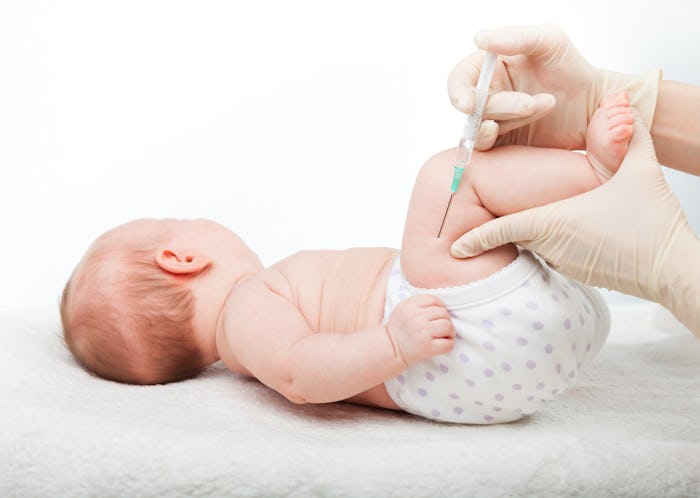Life

Stop Worrying About These 9 Things When You Vaccinate Your Kid
I find it infuriating that there's a controversy over vaccines. It's the first worldliest of first world privileges to opt out of vaccinating your child. The only reason it "works" is because the rest of us are doing what we're supposed to. Millions of parents around the world would give anything to be able to protect their kids from preventable diseases. But with all the loudly-expressed willful ignorance out there, it's no wonder parents have concerns. Let me (and science) tell you that those fears you have when you vaccinate your kid are nothing to worry about. No, seriously. Like, you guys, I'm making a promise here (and so is science and logic and reason, but we can get to that later).
I have a 2-year-old daughter, and she has been fully vaccinated according to the Center for Disease Control and Prevention (CDC) vaccination schedule. It wasn't even a question for me that she would get all her shots on time and as recommended by people who are way smarter than me. Like most children, she did not experience any adverse reactions. It was painful in the moment, sure, but she got over it really quickly. The best part, however? My daughter will never get any of the devastating and even deadly diseases that we've managed to virtually eradicate in this country thanks to the medical marvel we now call vaccinations.
Vaccines are an uncomfortable but necessary part of childhood in this day and age. As a parent, you have better things to do than worry about vaccination and any of the following:
Autism
Say it with me once and for all and in unison and as loudly as possible, for the people in the back of the room who may or may not be paying attention: "Vaccines don't cause autism." According to the CDC, there is no link between receiving vaccines and developing autism spectrum disorder. Sadly, however, thanks to a 1997 study that has since been completely debunked, this myth persists and to the detriment of public health.
Side Effects
It's not that side effects don't occur. They do, but they are usually minor and temporary, in the form of a mild fever or soreness at the injection site. Nothing a little Children's Tylenol can't handle. According to the World Health Organization (WHO), severe adverse events occur rarely, from one in every thousand to one in every million. I like those odds a lot more than the chances of my daughter surviving a bout of diphtheria.
Toxins
Exposure to mercury is the most common fear of parents. Vaccines do contain preservatives, but thimerosal has been out of the picture since 2001. Thimerosal breaks down into ethylmercury, but it doesn't accumulate in the body. Taking is out is just a precaution (and likely a response to the albeit unfounded mercury concerns). Anything else in there (aluminum, for example) is found in such trace amounts as to have no long-term effects.
Overwhelming Your Child's Immune System
Vaccines do not weaken a child's immune system. In fact, they strengthen it by providing it with tools to fight various bacterial and viral infections. Infants actually have an incredible capacity to respond to multiple vaccines. According to PublicHealth, even if a baby received all 14 recommended shots at once, it would only use up 0.1 percent of their immune capacity. Wow!
You know what actually overwhelms a child's immune system? Measles. Mumps. Whooping cough. You get the idea.
How Many Shots They Get
The "too many, too soon" argument is, honestly, bullsh*t. I guess I kind of get it on paper. I mean, compared with the five shots babies got 50 years ago, 14 shots before age 2 can seem excessive. But all it means is that we're able to protect our kids against more diseases. And even though there are more shots, kids today are exposed to fewer antigens (the stuff in shots that cause the production of antibodies). As for too soon, we need to protect children from diseases their little bodies can't handle as soon as it's safe to do so.
The Vaccine Schedule
If you see a "delayed" or "alternative" vaccine schedule, just move along. They are not research-based and have zero medical benefit. They just sound nice. The CDC schedule was developed by experts in the field who were held to the highest of standards. It offers the best and safest way to protect your child from preventable communicable disease. Period.
Pain
Yes, shots hurt. You know this from experience. Nobody's all, "Can't wait to get me some shots today!" Injections will hurt your child, and it will probably be hard for you to watch. That pain is mild and fleeting, though, and undoubtably a small price to pay for the incredible benefits of vaccination. Furthermore, watching your child cry after a shot is so much better than watching your child unnecessarily suffer from a terrible disease.
Crying (Yours & Your Kid's)
Babies have no other way to express their displeasure than to cry. Worse, you can't explain to them that you're doing it for your own good. Be prepared for tears all around, but try to remember that this isn't a traumatizing life event. If you're ready to provide comfort and praise when it's all over, the crying will cease before you know it.
Anti-Vaxxer Shaming
I'm not saying it won't happen because, you know, it might. I'm saying you shouldn't worry about it. There's nothing you can say to convince people who are entrenched in their anti-vaccination opinions. Honestly, I think they should be required to look at pictures of kids in iron lungs, but that's just me. Let them talk, and until your child is fully vaccinated, keep their kids the hell away from yours.